Okay, so this is actually something I have done for my company's blog, but I thought I would share it here too. Please support these guys by visiting their page (and our blog too if you're feeling generous), and help them gain some exposure!
*******************************************************************************************************************************************************
We met up recently with two of the founding members of the three-person Playful Panda Studio for a quick chat about their game, Eternal Spirits, the local scene and the industry in general. Here is some of what we discussed…
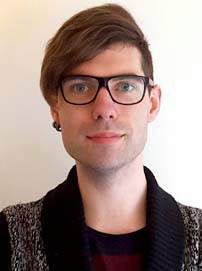
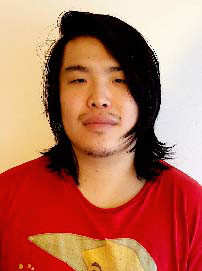
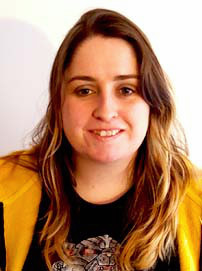
So, how about you introduce yourselves and tell us a little of your history?
(JC) Sure, my name is Joe Chu. I was born in Hong Kong, but live in Dublin. I have completed a Masters Degree in Digital Games, as well as a four year course in animation. I’m one of the main founders of Playful Panda Studios.
(AD) Hi, I’m Audrey Dooley and I’m also one of the main founders of Playful Panda Studios. I did the same animation course as Joe, which is where we met. It’s also where we met our coder, Sean.
Where did you complete your courses?
(JC) I did my Masters at D.I.T.
(AD) Yeah, and our animation course was done at IADT in Dun Laoghaire.
And was it during this time that you decided to form Playful Panda Studios?
(JC) Not quite. We used to get the same bus back together after college. We would talk about different ideas for animation shorts and different things related to the course, but we also had a friend who was focusing more on videogame animation and that got us talking about our own ideas for games.
(AD) Yeah, because normally when you are in the final year of the animation course you would have to make a film, but our friend had decided that he was going to make a videogame and we would obviously talk to him about that.
(JC) So then, I had a game that I had submitted for my final project in my Masters, and I was thinking it would be cool to take those ideas and develop them further once I graduated. I asked Audrey and Sean if they were interested in working on them with me, and they said yes. That was pretty much how we started as a studio.
So, tell us a little about your game, Eternal Spirits.
(JC) Well Eternal Spirits is basically a metroidvania action platformer. You have four different elements which you unlock as you play through the game, each of which have different platforming and combat abilities associated with them. We didn’t want to simply copy the flow that you get in a typical modern Castlevania game in which, once you reach a certain point, you just become a complete powerhouse. So instead we decided to make it so that each of the special abilities require you to be in a specific form to perform them.
(AD) Yeah so this means a lot of switching between forms. So say for example you want to double jump and then stick to the wall, you need to change form in between those two actions.
(JC) Exactly. So it’s different to other metroidvania style games in the sense that it requires you to be constantly thinking on your feet. You have to figure out which form you need in each specific moment in order to pass through an area.
(AD) This applies to the combat as well. For each element there will be a different category of weapon.
(JC) Basically this will be that Earth has a hammer, Fire has a sword, Wind has a bow and Water has a spear. And since the Fire form has the lowest platforming agility, we have balanced it so that the sword then does the most damage out of all the elements. On the other hand, the Wind form has the highest movement agility and therefore conducts the least amount of damage. This ensures that the player can’t just stay in the one form all the time, as if they do they won’t be able to make it through certain areas of the game.
How do you make changing forms into something fun for the player rather than something frustrating and fiddly?
(JC) Controls are very important. At the moment we have it so that the four forms are mapped to the four face buttons on the controller, with jump on one of the triggers.
(AD) That triggered a lot of debates during playtesting…
(JC) Yeah, definitely. Some people really wanted it so that jump would be on the A or X button and the form switching to be put on the triggers, but this presents its own problems as well. Right now, for the purposes of playtesting we are keeping the forms on the face buttons, but the controls are very important to ensure the game isn’t frustrating so we might consider customisable controls in future.
(AD) We did surveys with the playtest and to be fair most people were of the opinion that while it was frustrating at first, it was something they could get used to. But like Joe says, it’s really hard to find the right balance sometimes.
Were you always planning on making a metroidvania style game?
(JC) Yeah, for me it was always going to be a metroidvania. I’m majorly influenced by older games and I’d been wanting to make this style of game for a long time. And while I appreciate that many designers want to innovate, I prefer to give people what they want more than anything.
And what are some of these influences?
(JC) Well the Castlevania series is obviously a major one. Anything from the real old school ones to Symphony of the Night or the GBA (Game Boy Advance ) titles. Even some of the ones that never came to Ireland like Rondo of Blood. Aside from the Castlevania games then we were heavily influenced by the Mega Man series, Shantae and of course the Metroid games.
(AD) More recently, I’ve been playing a lot of Outland and Ori and the Blind Forest. They’ve been really great for getting ideas about gameplay and art design. Also, we are all big into anime so that’s been a huge influence over the visual style of the game.
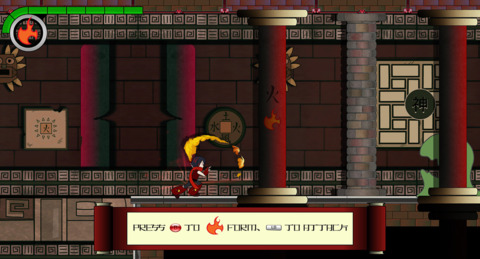
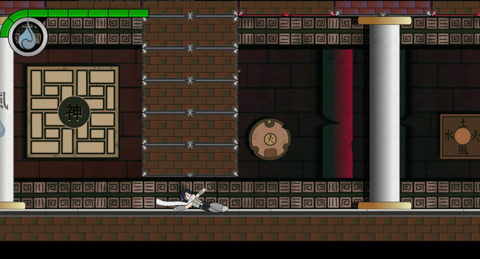
What are the major design difficulties you faced?
(JC) The map!
(AD) Haha.
(JC) The map, for sure. It’s the biggest part of any metroidvania game. You find power-up A to gain access to door A. You find power-up B to access door B. It involves a lot of backtracking, and finding a way to stop that backtracking from becoming monotonous is really tough. You need to have interesting mechanics and you need a strong art design.
(AD) Yeah, it’s important to find a balance between being interesting and having the right level of difficulty. We both come from animation backgrounds and that can be massively different to games. In standard animation you would design each background and animation like it’s a still shot, whereas in games, there’s a lot more movement and interaction between assets. And they all have to be designed individually. In backgrounds for example, you don’t just have a single background, but lots of different pieces that all have to be able to move at different times. It can be really challenging to figure all that stuff out. Ori and the Blind Forest is a really great example of how to do backgrounds well. It’s almost like a scene from a Studio Ghibli film, but with individual parts that actually move. Like the grass in the foreground…it’s so subtle that you probably wouldn’t even notice it if you weren’t looking specifically for it, but you definitely “feel” it when you’re playing.
(JC) Yeah, the visuals are really important to these types of game. Look at Symphony of the Night for example. In that game, every background is unique and interesting. So when you do backtrack you have a sense of movement and place.
Is any of Eternal Spirits hand drawn?
(AD) Yeah, it’s all hand drawn digitally and in 2D, made using a program called Toon Boom.
(JC) No 3D at all. Everything has been drawn by hand.
Wow, I imagine that must be a lot of work…
(JC) Yeah, it was tough at times. I mean, it wasn’t so much a struggle because we know what we’re doing, but we’re old school and prefer 2D artwork. So drawing every frame of every animation and background in this way is extremely time-consuming.
(AD) But you know, we were taught animation at college with real paper and real desks. So really, we’re just applying the old-school mentality we learned there into digital.
Do you share responsibilities or do you each have a set role?
(AD) Although we do share responsibility and check up on each other, we like to focus on our strengths also. For example, I would be good at roughing out things like characters or animations, whereas Joe is very good at being precise.
(JC) Yeah, I’ll finalise the clean ups and make sure things look smooth. It’s mainly me and Audrey on the art side of things, whereas Sean is pretty much solely on code. We have just fixed up my apartment as well and have all three of our computers set up there, so that lets us get together more frequently to work together on the game.
How do you approach tasks like bug testing and balancing?
(JC) Playtesting by other people is extremely important when making a game. Because, as much as you are making a game that you yourself will enjoy, you really want other people to enjoy it as well. It’s so easy to become stuck in a “everything seems fine” attitude when you play your own work, but when third parties play through it they will often have issues with the gameplay or encounter bugs that you would never find or think of by yourself. I even remember Audrey coming across a bug when she was playing through an early version of the game that I would never have found. It only appeared after she pressed this almost random combination of button inputs and it would cause the character to become stuck on an animation frame.
(AD) Ha ha, yeah! It had to be such a precise set of inputs to make the bug appear as well!
(JC) Once we found out how the bug occurred then we were able to fix it, but it just shows the importance of getting other people to playtest your work. Another thing you can take from having your game tested is, like we were saying before, you can use the experience of the player to determine where the game needs balancing. The more experienced players will very quickly work out the optimal path through certain areas and show us exploits we weren’t aware of. This is definitely one of the most helpful aspects of playtesting for us. And also, ultimately, you will have people tell you whether they actually like your game or not and where they think it needs improving. So you really need to be able to take on board advice in good conscience.
Switching topics slightly, what’s the local game development scene like at the moment? From the outside, it seems to be quite small…
(JC) It is small, but at the same time there’s a lot of really ambitious people here as well. There’s so much going on and everybody is trying to do something unique and cool. And being so small it means that there’s lot of opportunity, through meetups and stuff, to really get some proper insight and feedback from other people in the scene.
(AD) Yeah, like we’ve put our game out there at gaming and anime conventions in the past for other developers to test and got some really great feedback -, both good and bad. And then as well, we would test their game and let them know what we think about their project.
(JC) Yeah, people in general have just been really lovely and willing to lend their insight as much as possible.
Do you feel like the scene receives sufficient support from the government and other agencies?
(JC) I wouldn’t necessarily be that knowledgeable about that side of things, but you do get the sense that Ireland isn’t really looked upon as a country for making games. A lot of people end up leaving the country to go form a studio in England, or to get a job in Germany or somewhere else in Europe, because the support they need to succeed just isn’t there. But making and funding a game is a massive gamble so you can understand it to some extent. As a small developer though, it can be hard when you probably also have a full-time or part-time job and you know there is little chance of securing funding.
(AD) Wasn’t there funding from some small government groups a few years ago? I don’t think the games worked out though…
(JC) Yeah, I think so. I know some people indirectly who were part of NDRC (National Digital Research Centre) and who funded the production of a few games locally. I think they put up quite a bit of money too! But in the end, like Audrey said, I don’t think the games turned out that successful money-wise, and it scared off other groups from further investment. But saying that, I heard that there is an Irish game that’s coming to the Xbox One so people are obviously excited for that…
(AD) The Little Acre game?
(JC) Yeah, that’s the one. So for sure, there is definitely hope for the Irish scene to become something bigger than it is now.
You can definitely see there is push to promote the local scene though in terms of education. It is hard to miss the adverts for the BCFE (Ballyfermot College of Further Education) for example…
(JC) Oh yeah, I think Ireland is properly embracing that side of things a bit more now. When I was doing my Masters, my course was focused on videogame coding and that was all pretty much all there was. But now, you have proper courses dedicated to game design like the four year course at Pulse (Pulse College, Dublin). All of a sudden there’s a lot more access available to actual teaching resources and knowledgeable people to teach the subject.
(AD) I think the skills linking to animation and games really cross over a lot as well, and this allows you to work in so many different fields. Like now, if you know animation you can work in the gaming industry. If you know code you can work in the gaming industry or work with websites for example. Ten years ago these might all have been separate skills, but now they’re all converging.
Over the course of the previous and current console generations, and in particular over the last couple of years, Sony and Microsoft have made big efforts to push the presence of indie games onto their online stores. Do you feel like this has opened up opportunities for smaller teams like yourselves that may not have been there previously?
(JC) Not for us per se, but I’d say it definitely has for some. Just look at games like Shovel Knight or Outland or Dust… There’s so many indie games coming to console nowadays. I don’t think anybody from Ireland has managed to get their games onto PSN yet, but like I said before The Little Acre is coming to the Xbox One so that’s definitely a positive sign for Ireland and smaller developers like ourselves.
(AD) It definitely seems like it’s working for developers in other countries.
(JC) Yeah, but I guess it just depends on whether you can come up with a game that is going to be a big hit or not.
(AD) And you just never know which games are going to be popular or not. So much of it is dependent on marketing. Sometimes, the actual quality of the game has very little to do with how successful a game will be. You see some really bad games do well, and equally games that deserve better do poorly. So marketing is really important.
Do you prefer a curated storefront like that of Sony or Microsoft? Or do you think the slightly more democratic approach favoured by Steam is the future?
(JC) Once you get through the popularity vote that is Greenlight then Steam is definitely the easier place to get your game on. And I’m not saying it’s open to just anybody, but you definitely see a lot of bad stuff make it through as well, like countless Android ports or shoddy private server MMORPGs. So it works both ways. A lot of bad stuff may get through, but it also allows developers like us to get our stuff out there and hopefully start making a little bit of money. Plus, it allows you to officially say you have your game on Steam which is obviously cool.
(AD) Yeah, and that gives you more control as an indie developer who is looking to make a smaller game.
Is that something important to you? If you had the option, would you move to a larger studio to further your career or would you prefer to keep your integrity as a small studio?
(JC) Well I cannot speak for Audrey or Sean, but personally, as one of the founders of Playful Panda Studios, I would prefer to stay together as a team.
(AD) Yeah, because the way we are going now gives us complete creative control and that’s extremely important.
So do you still see yourselves remaining as a team together in ten years from now?
(JC) Yeah I think so, and hopefully by then we will have a bigger team and will be making a lot more games. I guess that’s everybody’s goal ultimately.
Do you already have ideas for your next games?
(AD) Actually, Eternal Spirits is supposed to be a trilogy…
(JC) Well the plan was that if the game does well then it would be part of a three-parter. But we have some other ideas as well. Like, I’m the primary platforming fan in the team, but the genre that we all share in common is RPG games. So, in future and if we were to be successful, then we would all like to make a JRPG style game…
(AD) With really good cinematics…
(JC) Yeah, well if budget was no issue then of course!
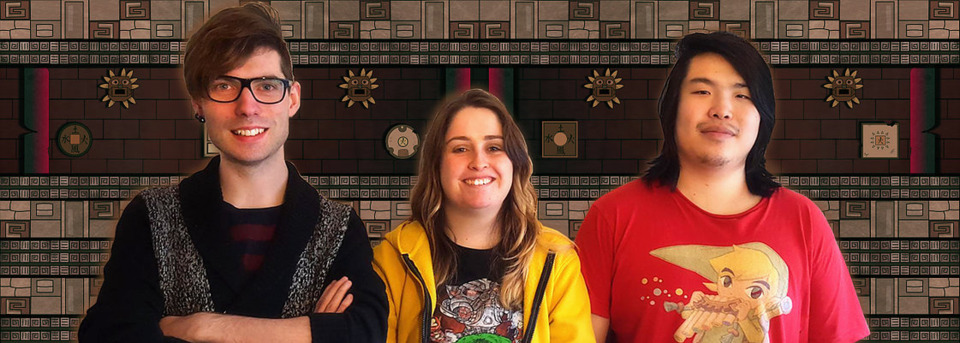
You talked about ideas for a mobile game…What are the major differences involved in making a game specifically for a mobile platform?
(JC) It’s mainly the same as for any other platform, but the general rule of thumb is to get a working build onto the device as quickly as possible. When you’re playing on a phone with a touch screen, controls are really important so it’s vital to get an idea early on of how well they work. You can do early playtesting on a PC, but sooner rather than later you are going to want to get the game working on the target device. In terms of game design though, I guess in general the idea for a mobile game is to make it playable in five or ten minute chunks. That’s not to say people won’t play them for longer periods than that, but as a rule you want a mobile game to be quick and easy. And playable with just one hand while standing up as well.
(AD) Yeah this is where games on phones are so different to those on PCs.
(JC) But, it all depends on the region you are aiming for as well. The Asian market for example will tend to prefer games with grinding and gachapon style aspects, whereas in the west the focus is more on building and waiting for it that building to be completed.
(AD) Just like in Clash of Clans where you have to wait a day for stuff to be built…
(JC) Wait or pay to speed up the process…
How do you feel about VR?
(JC) I think VR will be a great thing in the future, but my worry at the moment is that it might fall the way of certain other platforms in which not enough good games come to it and people lose interest. If you look at the PSVR as well…it looks cool, but at the same time I don’t know if the PS4 itself if powerful enough to really deliver. Like the fidelity of the image has to be reduced to make it work. Sony are going to have to make a whole new machine to get it up to the standard of the other headsets and people aren’t going to be too happy if a new console is released so soon after the PS4. Also, while I do think the tech is great and can be a lot of fun, I think in the end people will always come back to a controller once the uniqueness of the experience wears off. I guess I’m just worried that it might be a little…gimmicky…
(AD) But at the same time, that’s what everybody said during the early days of videogames as a whole. And then look at machines like the Wii and how commercially successful that was for Nintendo.
So, to wrap up, what changes have you seen in the local game development scene and how would you like to see it change in future?
(JC) Well, like we were saying before, I think the popularity of college courses is a big change compared to even when we were coming through. There’s a lot more people taking animation courses nowadays and the scores for getting into them are a lot higher than where they were before.
(AD) Yeah, it’s definitely harder to get in now. There’s a lot more people are applying. When we started college the options for things like game design just weren’t there.
(JC) Now, we have proper teachers and lecturers and a really passionate and like-minded local community for giving advice and feedback. If I had to change something though going forward though, then I suppose it would be for more gambling on funding for the local developers. I know some games have failed in the past, but that doesn’t mean that the scene won’t produce something great in the future.
Playful Panda Studio are a three person game development studio based in Dublin, Ireland. They can be found at the following locations where a downloadable demo of their game, Eternal Spirits, is also available:
Email: playfulpandastudio@gmail.com
Facebook: Eternal Spirits
Twitter: @DublinPanda
Tumblr: playful-pandas
Log in to comment